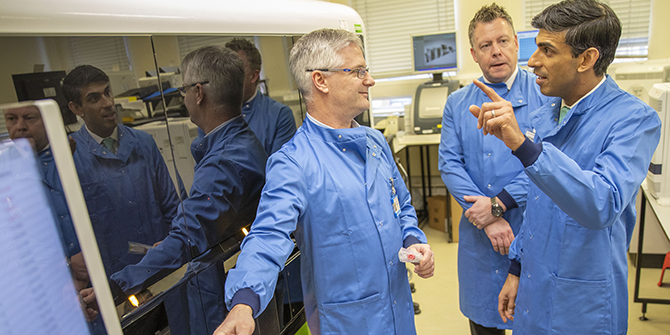 Political science is not more visible or more relevant than before. There is a real problem that must be addressed. Matt Flinders argues that our choice is to continue drifting amid frequent criticisms or seek to proactively steer a course towards illustrating our capacity for social engagement, impact and relevance.
Political science is not more visible or more relevant than before. There is a real problem that must be addressed. Matt Flinders argues that our choice is to continue drifting amid frequent criticisms or seek to proactively steer a course towards illustrating our capacity for social engagement, impact and relevance.
What I think is particularly interesting about Peter John’s recent rebuttal of my general argument is the way in which it reflects a certain view of both the study of politics and the role of a professor of politics that I think has itself become dangerously dated. I want to take this opportunity to flesh-out why I feel this way and also to highlight a number of disciplinary cul-de-sacs or dead-ends that we – by which I mean the profession – urgently need to move beyond. So let me respond to what I see as the three main elements of his defence of political science – (1) that I am harping back to a ‘golden age’ that never existed; (2) that there is an anti-intellectual culture within the fibres of the British political system that prevents academics from engaging; and (3) that the context of higher education has changed to the extent that my critique is outdated – before seeking to make a plea for a more ambitious, creative and engaged model of political science.
Defence 1 – The Golden Age
Any discussion of a halcyon ‘golden age’ of any institution, individual or profession rarely stand-up to careful scrutiny and I must therefore step-over this elephant trap with the simple assertion that I am not really arguing in favour of a step-back in professional terms to a vaunted period of publicly-orientated research. My argument is more subtle and involves an appreciation of the changing culture and context of academe.
My argument is not so much that there was a specific period in which the vast majority of political scientists were willing to soil their hands in the dirty world of politics but I am saying that for the first three-quarters of the twentieth century in the UK there was a less rigid separation between academe and politics. I also believe that the culture of political science at the time emphasised the professional responsibilities of academics to the public at large in terms of stimulating public debate, promoting active citizenship and being willing to ‘profess’ beyond the lecture theatre.
It would, however, be completely wrong to take too much from a rather rosy view of the past and I am more than willing to accept this. Standards of teaching, training, staff induction, student support and a host of other elements of higher education have improved beyond recognition in recent decades. And yet I cannot help but feel that this process of vaunted ‘professionalisation’ has robbed us of a certain sense of meaning, or energy, of passion, of vim and whit, of creativity and ambition, and of a willingness to challenge basic assumptions. There are of course a significant number of political scientists who are active within the corridors of power but I cannot help but think that you are over-stating their number and impact. Find me the minister, MP, civil servant or committee clerk who is willing to stand-up and argue that overall the political studies community is anywhere near as active and engaged as it should be….
Let me be even more strident. I don’t want to look back to a ‘golden age’ or to depend on ‘grand old men’ public figures in the way you suggest I want to, but I do want to look forward to a new age of political science in which scholars are actively encouraged to write for mass audiences – and not just for other academics – in a way that promotes the public understanding of politics, that stimulates public engagement and which plays a role in delivering a healthy democracy via active citizenship.
Defence 2 – Anti-Intellectual Culture
You seem to suggest that it is actually very hard for scholars to engage with politicians or the media due to the existence of an anti-intellectual culture. This is an interesting and double-barbed argument. It is also an argument where we have very little hard evidence to help us assess the strength of this perceived barrier to engagement. My experience leads me to suggest, however, that the biggest cultural obstacle to greater public and political engagement lies within the innate elitism of British academic life rather than within the public sphere more generally. This is a critical point. If some elements of the political system or media infrastructure possess an anti-intellectual culture then it is also true that large elements of academe seem to possess an equally problematic anti-public culture in the sense that any academic who writes for a public audience or who regularly appears on the television risks being immediately labelled as ‘quasi-journalistic’ or a ‘media don’.
Instead of an anti-intellectual culture within the institutions of society what we really have is a ‘clash of cultures’ that hinges on the innate tensions between the demands of the media and politicians (short deadlines, accessible language, succinct analyses, etc.) and those of academe (far longer timeframes, an emphasis on reflection and complexity, a technical and conceptual vocabulary, etc.) and the profession needs to find new ways of reconciling these demands (an issue I discuss below).
Let me finish on this point with a large dose of positivity. In my experience newspaper editors, television producers, senior civil servants and select committee clerks are crying-out for political scientists that are willing and able to engage with them. There is no anti-intellectual culture but simply a need for academics to talk and write in plain English.
My three-part series on BBC Radio 4 in 2011 attracted 2.5 million listeners and arose from a simple email I sent to a producer whose name I had found on the internet. I write for a number of national papers not on the basis of any special personal, family or social connections but simply due to my willingness to email the editors with simple ideas for interesting little political articles.
For those readers who are interested in working more closely with select committees I have written a simple guidance paper as part of the ESRC’s ‘Impact Toolkit’ that can be downloaded here. My experience therefore suggests that the anti-intellectual culture that is often ascribed to a range of institutions is little more than a myth.
Defence 3 – The Changing Academic Context
The academic context in which political scientists are expected to operate has clearly changed dramatically in recent decades and it is for this exact reason that I am reluctant to look back to any ‘golden age’ because (1) it was not quite so ‘golden’ as you might think but also (2) because the pressures and demands on academics have increased across a range of dimensions. A great deal of my recent academic research has focused on what I call ‘the politics of public expectations’ and more specifically upon the existence of an ‘expectations gap’ between what is demanded and what can realistically be provided with the resources that are supplied. In many ways there is no better case study of this ‘expectations gap’ than higher education as the demands of teaching, administrating, bid-winning, research and writing have altered the nature of being a modern academic in many ways. And to this already extensive list of expectations we are now expected to deliver demonstrable evidence of social impact and relevance. Within this broader academic context my specific argument is simple and not particularly original: in recent years we have allowed the demands of the Research Assessment Exercise to skew our energies and activities in a way that has left us vulnerable to accusations of insularity, inaccessibility and social irrelevance. This emphasis was cemented by a career structure that implicitly linked the production of academic monographs or peer-reviewed articles with promotion.
You are undoubtedly correct that this situation is changing. With the ‘2012 agenda’ and the introduction of much higher student fees, there is no doubt that teaching has suddenly become far more important than it arguably was just a couple of years ago. It is also true that the broader social pressures for greater evidence of impact and relevance is helping to foster a more rounded skill-set than simply being able to write for a small academic audience. And yet my sense is that – if we are honest – the pace of change is simply too slow, too glacial. I’m well aware of the excellent work of the Political Studies Association and its work with the Annual Awards Ceremony and the influential Media Breakfast Briefings – indeed I serve on the Executive Committee of the PSA and have chaired the Communications and Engagement Sub-Committee in recent years – and as a result I am also aware of how hard it is to encourage many members of the profession to engage more broadly when opportunities arise (or even to become members of the PSA!).
This may reflect the simple fact that when all is said and done it is the ‘Publications’ element of any application for promotion or for a job that will generally receive far more attention that those sections covering ‘teaching’ or ‘public goods’. So yes, I am willing to concede that there has been some shift away from an almost obsessive focus on publications, but I am not willing to concede that profession is no longer primarily incentivised around the publication of academic outputs. Day-after-day-after-day I am constantly hearing reports of pre-REF2014 internal university audits in which the sword of Damocles hangs over anyone whose published work is not considered 3* or above (irrespective of how gifted they are as teachers or public communicators).
Peter- would you like me to be completely honest? I’ve won a lot of prizes, I’ve been awarded a lot of fellowships, I’ve written a lot of books and – what’s more – I’ve had a lot of fun along the way but I’m beginning to wonder whether my expectations and understanding of the role of a university professor of politics are so out of kilter with the profession itself that I need to find a different vocation. The incredibly positive response I have received since the speech in Belfast – in which I somehow managed to say the word ‘masturbation’ four times – has given my great hope in the future. The younger generations of the profession are hungry for change. And yet if you think that political science is far more visible and relevant than I (or Peter Riddell) suggested in Belfast then one of us is seriously wrong… or are we? Let me conclude my response to Peter’s riposte by very quickly setting out a vision of the future which I think not only brings our positions together – positions that are united in their commitment to a healthy, vigorous and pluralistic vision of the discipline – but which also hopefully provides a template through which new entrants to the profession can build a world-class research profile.
Political Science in the Twenty-First Century
This debate about the impact and relevance of political science in the UK is not about you or me – it is about the future of a discipline that for a range of reasons is currently the subject of a number of criticisms and the focus of a new set of demands. The problem we face is that the professional skills we equip new entrants to the profession with, the dominant academic culture we wrap them in and the incentive structure we then plug them into does very little to respond to the demands for greater external accessibility, engagement and social relevance that the world around us is demanding. Political science needs to work not harder but smarter; smarter in the sense of recognising that the next generation of political scientists will have to master the art of triple-writing (a technique of writing and dissemination that cascades the outputs of any research project along a three-part process).
Phase 1: Research results, findings and implications are written-up into traditional academic outputs like books and articles [i.e. Single-writing].
Phase 2: The same research then forms the basis of a short research-note that is intended to be both accessible and of value to a range of user-groups [i.e. Double-writing].
Phase 3: In the final stage the research forms the focus of a number of succinct, pithy and even controversial articles for newspapers, magazines or popular websites [i.e. Triple-writing].
Triple writing therefore provides a way of bridging the academic and public spheres without diluting academic standards. Academics can draw upon any methods, theories, approaches or vocabularies in relation to Phase 1 writing and are only required to write in a more accessibly manner in Phases 2 and 3. My critique of the discipline is that it has (and remains) almost exclusively focused on Phase 1, whereas you seem to be arguing that a lot of scholars are already utilising new forms of technology in relation to Phases 2 and 3. If you are correct and we can do more to develop a disciplinary ‘impact audit’ through which to promote and develop the broader visibility of the discipline then all well and good. And yet I think it is at exactly this point that the root of our disagreement becomes clear. Could it be that you are adopting a far narrower view of ‘impact’ and ‘social relevance’ than I am?
Please read our comments policy before posting.
Note: This article gives the views of the author, and not the position of the British Politics and Policy blog, nor of the London School of Economics.
Matt Flinders is a Professor in the Department of Government at Sheffield University. He also sits on the Executive Committee of the Political Studies Association. Professor Flinders is also a writer and broadcaster and has made numerous contributions to national newspapers, including The Times and The Guardian, and in 2011 he wrote and presented a three-part series for BBC Radio 4 entitled ‘In Defence of Politics’.







Sir,
I have problems to access the ‘Impact Toolkit.’
Kindly,
@olgag
Dear Sir,
I founded your article very interesting indeed. Specially when you say: “I do want to look forward to a new age of political science in which scholars are actively encouraged to write for mass audiences – and not just for other academics – in a way that promotes the public understanding of politics, that stimulates public engagement and which plays a role in delivering a healthy democracy via active citizenship.”
I am a political scientist with the same concerns, and I am trying to engage at two levels:
1) with my students, I encorage and teach ways for them to produce works that can be openly accesible through the web. The aim is to build the conection engagement-student-society-political science.
Two examples on acomplishments: This is part of a work done by students on Chile: http://www.slideshare.net/danielregidor, and this other one: http://www.scoop.it/t/presidencialismo-en-chile/
2) With research projects: I was asked five months ago to chair a Forum on Networks and Global Change. Following the suggestion of the professor who asked me to be in charge, several of the seven experts involved are experimenting with a variety of methods to share openly in advance some of the research for the Forum. The examples are here: http://www.ticwisdom.com/?p=559
I believe that we should have a lot of interesting work to do getting more involved, with other disciplines and with society in general.
Kindly,
Olga Gil